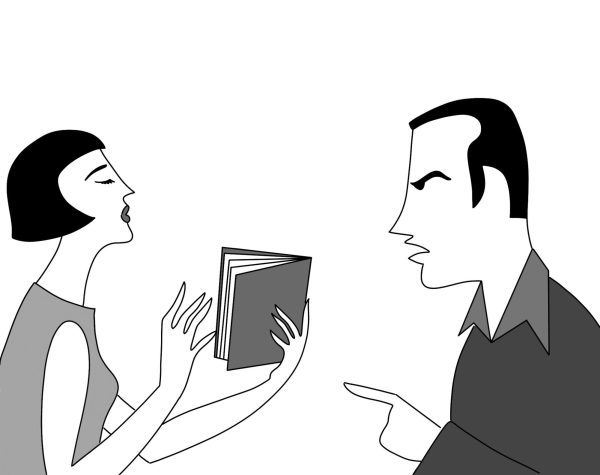It’s a balmy summer day –– you’re comfortably hanging on a hammock outside, and you want to do some light reading, so you open up your phone and peruse through Wattpad when you read this: “A lecherous sunrise flaunted itself over a flatulent sea, ripping the obsidian bodice of night asunder with its rapacious fingers of gold, thus exposing her dusky bosom to the dawn’s ogling stare.”
Except you’re not on Wattpad. And that’s not fanfiction. Those are the words of Stu Duval, which the New Zealand Herald regarded as a “triumph.”
This is not to suggest, implicitly or otherwise, that there is not an ample supply of unintelligible fanfiction written by 13-year-olds that exists on the internet. If anything, the supply is superfluous. However, those who criticize the genre categorized by unoriginality and erotica are clearly not reading some of the most commended published literature.
Even classics that are posthumously defined as having “a certain level of complexity and depth, which enables them to transcend the time in which it was written,” according to the UK publishing house Pan Mcmillan, are sometimes undecipherable trash. William Faulkner — who won a Pulitzer Prize for fiction — is a primary example. His book “As I Lay Dying” was entirely unedited and written in six weeks while Faulkner was inebriated. In his nineteenth chapter, there are only five words: “My mother is a fish.”
That’s it. And no, there is no mention of fish anywhere else in the book. Despite what pretentious book critics feign, it’s not an allegory or metaphor, it’s just the prattle of a man who needed an editor.
Unbelievably, that was one of the sentences that led Faulkner to reap a Nobel Prize for Literature.
Similarly, in her novel “November 9”, Colleen Hoover writes, “It’s the first thing he’s said to me all day that’s made me feel like I was being spoken to by my father. I’m not gonna lie. It hurts.”
Somehow, “November 9” alone sold nearly one million copies. Colleen Hoover’s other books — 26 of a similar caliber quality — sold more copies than the Bible in 2022, according to News24.
These examples, all evocative(ly terrible), are not a testament to the deterioration of the literary world — they simply prove that bad writing exists, not just exclusively from the laptops of fanfiction writers, but also in the books of Nobel Prize winners, New York Times bestsellers, Pulitzer Prize winners and book sale chart-toppers.

Moreover, the bad reputation that orbits fanfiction is antithetical to a species whose lives are wholeheartedly characterized by innovation. Our world, fundamentally, would not be the same without smartphones, lightbulbs or even the wheel. Technologically, innovation is crucial. Why is cultural innovation not the same? No one cares about originality in science or technology — not when women like Rosalind Franklin and Hedy Lemarr didn’t receive credit for their tremendous contributions and their male counterparts did. So, why can’t people digest the idea of someone rewriting Harry Potter to be gay?
The short answer is people can. They just don’t comprehend how often they consume fanfiction. Fanfiction, loosely or explicitly defined as such, comprises an ample amount of cultural keystones. For example, “Bridget Jones’ Diary,” which grossed nearly 290 million dollars according to Box Office Mojo, is a fanfiction version of “Pride and Prejudice.” So are “Clueless,” “10 Things I Hate About You” and “Sherlock.”
Even “Wicked,” which was the fourth longest-running musical on Broadway and its second-highest grossing, is hardcore fanfiction; its film adaptation has also been tremendously successful, ranking as the highest-grossing musical-film adaptation of all time. No one who has seen “Wicked” — the movie, musical or book — can argue that it is not a tremendous work of creative ingenuity, fanfiction or not.
This is not to say that fanfiction should not face a healthy level of criticism; it should. But so should classics, romance, science-fiction, fantasy, historical fiction and every other major fictional sub-genre.
If anything, people should be more critical of everything they’re reading — the books that are on Advanced Placement English courses’ reading lists, that win awards and best-sell. They should be critical of the words of low-quality literature sold in Barnes & Noble and available on the shelves of the Redwood library — not exclusively those that exist on fanfiction sites.
Most likely, literary elitists will continue to dictate what should or should not qualify as “literature,” but fortunately, that definition doesn’t mean anything anymore, not when we’ve spent centuries using it to define words written by drunk men.
Infographic by Larkin Moffet








